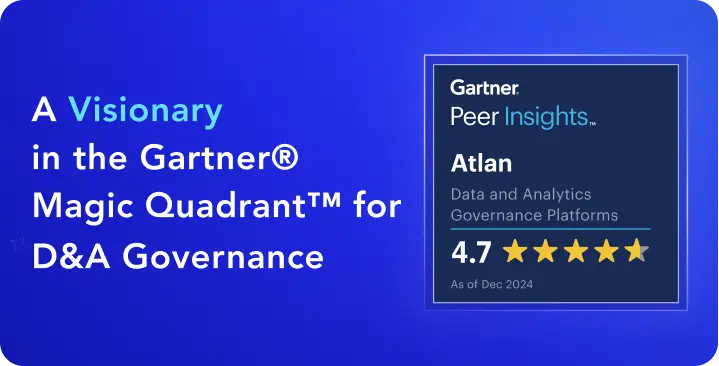What Does a HIPAA Privacy Officer Do? 11 Core Responsibilities to Know
Share this article
In the United States alone, over 29 million health records were compromised in various breaches throughout a single year, highlighting the crucial need for dedicated HIPAA privacy officers. These professionals have the responsibility of keeping patient information secure, and they stand as the first line of defense against data violations in healthcare.
A HIPAA privacy officer is a specialized role focused on developing, implementing, and enforcing policies and procedures that ensure an organization’s compliance with the Health Insurance Portability and Accountability Act (HIPAA). They ensure a healthcare organization properly handles patient information according to legal standards.
See How Atlan Simplifies Data Governance – Start Product Tour
In this article, we will explore:
- Defining a HIPAA privacy officer
- Requirements for aspiring officers
- Core roles and responsibilities
- HIPAA privacy officer’s job description
- Privacy vs. security roles
So, let’s dive in!
Table of contents #
- Who is a HIPAA privacy officer?
- Requirements
- Responsibilities
- A comprehensive job description of a HIPAA privacy office
- HIPAA privacy officer vs security officer
- Conclusion
- Related reads
Who is a HIPAA privacy officer? #
A HIPAA privacy officer is a key figure within healthcare organizations, charged with ensuring compliance with the privacy rule established under the Health Insurance Portability and Accountability Act (HIPAA).
This individual develops, implements, and oversees policies that protect patient health information, ensuring that the organization adheres to the required privacy practices.
The officer’s responsibilities include training healthcare staff on privacy protocols, conducting routine compliance reviews, and managing inquiries and complaints about patient privacy rights.
They also handle incidents involving the potential breach of protected health information (PHI), making certain that all matters are resolved in accordance with HIPAA regulations.
In summary, the HIPAA privacy officer is the keystone in safeguarding patient privacy, bridging regulatory mandates with the healthcare entity’s operations.
Their expertise ensures that patient information is treated with the highest level of confidentiality, maintaining the essential trust between patients and healthcare providers.
10 Essential requirements to become a HIPAA privacy officer #
Starting the journey of becoming a HIPAA privacy officer demands a blend of specialized knowledge, skills, and personal attributes.
This role is not only about understanding laws and regulations; it’s about interpreting and applying them within the healthcare sector to protect patient privacy.
The qualifications required to become a HIPAA privacy officer ensure that only those ready to take this responsibility and navigate its complexities step into the role.
Here are 10 Essential requirements to become a HIPAA privacy officer:
- In-depth knowledge of HIPAA regulations
- A background in healthcare or legal studies
- Experience with compliance and risk management
- Strong communication skills
- Leadership and training abilities
- Analytical and problem-solving skills
- Detail-oriented approach
- Understanding of IT and data security principles
- Professional certifications
- Commitment to ongoing education
Let’s look into each of the above requirements in brief.
1. In-depth knowledge of HIPAA regulations #
A thorough understanding of HIPAA is non-negotiable. Aspiring officers must be well-versed in the nuances of the privacy and security rules and how they apply to various healthcare scenarios.
This knowledge forms the foundation of all the privacy officer’s duties, from policy development to compliance monitoring.
2. A background in healthcare or legal studies #
A background in healthcare, law, or a related field is typically required, providing a HIPAA privacy officer with the context for the regulations they will be overseeing.
This background ensures they are familiar with healthcare operations and the importance of patient data privacy, giving them insight into the practical application of HIPAA.
3. Experience with compliance and risk management #
Experience in compliance and risk management positions candidates to effectively assess and manage the risks associated with the handling of PHI.
This experience is critical for conducting accurate risk assessments and developing strategic mitigation plans.
4. Strong communication skills #
HIPAA privacy officers must have excellent communication skills, as they are responsible for conveying complex information to a variety of audiences.
They must be able to explain HIPAA regulations to staff members, communicate privacy policies to patients, and coordinate with regulatory bodies.
5. Leadership and training abilities #
Leadership is key in this role, as privacy officers often lead training sessions and must influence the organization’s culture around patient privacy.
They should be capable of designing and implementing training programs that effectively educate staff on HIPAA requirements.
6. Analytical and problem-solving skills #
The ability to analyze situations, interpret data, and develop solutions is crucial.
Privacy officers face complex problems and must be able to devise and implement practical solutions that comply with HIPAA while supporting the needs of the organization.
7. Detail-oriented approach #
Attention to detail is paramount. Privacy officers must be able to scrutinize policies and procedures, ensuring no aspect of compliance is overlooked.
They also need to maintain meticulous records of all privacy-related activities and incidents.
8. Understanding of IT and data security principles #
A HIPAA privacy officer doesn’t need to be an IT expert but should have a solid understanding of electronic PHI (e-PHI) and the technologies used to protect it.
Familiarity with IT security principles allows them to work effectively with technical staff and to appreciate the complexities of data security.
9. Professional certifications #
While not always mandatory, professional certifications related to healthcare privacy and security can give candidates a significant edge.
Certifications demonstrate a commitment to the field and a mastery of the subject matter.
10. Commitment to ongoing education #
The healthcare field and privacy regulations are ever-evolving, so a commitment to continuous learning is necessary.
Privacy officers must stay up-to-date of changes in laws, technologies, and best practices to ensure ongoing compliance and effective privacy management.
The road to becoming a HIPAA privacy officer is paved with a combination of education, experience, and personal dedication to the principles of patient privacy.
Those who pursue this path must be ready to continuously evolve, ensuring that their knowledge and skills meet the demands of a role critical to the healthcare industry’s integrity.
Along with these 10 Essential qualifications, a HIPAA privacy officer is well-equipped to safeguard patient privacy and steer their organization toward steady compliance with HIPAA regulations.
11 Core roles and responsibilities of a HIPAA privacy officer #
In the dynamic landscape of healthcare data protection, the role of a HIPAA privacy officer is multifaceted and integral to an organization’s compliance with federal regulations.
Their responsibilities are broad and vital, including various aspects of privacy management, from policy development to incident response.
The core responsibilities of a HIPAA privacy officer include:
- Policy development and implementation
- Staff training and education
- Handling inquiries and complaints
- Performing risk assessments and remediation
- Managing access control
- Establishing breach response protocols
- Liaising with regulatory bodies
- Partnering with IT and security teams
- Reviewing and updating privacy practices
- Documentation and records maintenance
- Advocating for patient privacy rights
Let’s look into each of the above responsibilities in brief.
1. Policy development and implementation #
The foundation of a HIPAA privacy officer’s role is to develop and implement robust privacy policies.
These policies serve as the blueprint for how patient information is handled, ensuring every action taken with personal health information (PHI) complies with HIPAA regulations.
The officer meticulously crafts these policies to reflect the unique workflows of their organization, addressing the nuances of patient data handling from admission to discharge.
They must consider various factors, such as technological advancements, changes in healthcare practices, and updates to HIPAA itself, to ensure that the policies are not only compliant but also practical and clearly understood by all staff members.
2. Staff training and education #
Continuous training and education of staff members are vital duties of the HIPAA privacy officer. They design and conduct educational programs that are not one-off events but rather an ongoing process to keep pace with the evolving landscape of healthcare data protection.
The training programs must be comprehensive, covering the dos and don’ts of PHI handling, the implications of non-compliance, and the importance of every employee’s role in safeguarding patient data.
This responsibility ensures that the staff remains aware, informed, and competent in the practices that protect patient privacy.
3. Handling inquiries and complaints #
The HIPAA privacy officer is the go-to individual for patients with questions or concerns about their privacy rights.
They must handle such inquiries with empathy and efficiency, providing clear explanations and resolutions to patient concerns.
They also oversee the process of logging complaints, investigating potential violations, and responding appropriately. This role is not just about regulatory compliance but also about customer service and maintaining the trust that patients place in the healthcare system.
4. Performing risk assessments and remediation #
To preemptively protect against breaches, the HIPAA privacy officer regularly performs risk assessments. These assessments help to identify any potential vulnerabilities in the handling and storage of PHI.
Following the assessment, the officer is responsible for developing and implementing remediation plans, addressing identified risks, and strengthening the organization’s defenses against privacy and security threats. This proactive approach is crucial in mitigating risks before they can materialize into breaches.
5. Managing access control #
One of the privacy officer’s key responsibilities is to oversee and regulate access to PHI.
They must ensure that such access is compliant with the ‘minimum necessary’ rule of HIPAA, which stipulates that healthcare providers and their associates should access only the information necessary to perform their job functions.
This involves setting up appropriate access controls within the organization’s information systems and regularly auditing these controls to prevent unauthorized access to sensitive information.
6. Establishing breach response protocols #
The HIPAA privacy officer must have a clearly defined protocol for responding to privacy breaches. This includes steps for breach notification, investigation, and mitigation, as well as strategies for preventing future incidents.
They are responsible for the management and oversight of the entire breach response process, coordinating with legal, IT, and communications departments to handle the situation effectively and minimize the impact on patients and the organization.
7. Liaising with regulatory bodies #
As the point of communication with external regulatory bodies, the HIPAA privacy officer is responsible for reporting breaches and compliance issues, as well as staying informed about regulatory changes.
They must maintain an open and transparent relationship with these entities, ensuring that the organization’s practices are in full compliance and any compliance issues are quickly addressed.
8. Partnering with IT and security teams #
The privacy officer collaborates closely with IT and security teams to ensure that PHI is protected across all digital platforms. They work together to implement security measures such as encryption, access logs, and secure data transmission protocols.
This partnership is essential in creating a secure digital infrastructure that safeguards PHI against unauthorized access and cyber threats.
9. Reviewing and updating privacy practices #
Given the fast-paced changes in healthcare delivery and technology, the HIPAA privacy officer is tasked with regularly reviewing and updating the organization’s privacy practices.
This ensures that the organization adapts to new challenges and opportunities, maintaining a posture of compliance and protection as the healthcare landscape evolves.
10. Documentation and records maintenance #
A HIPAA privacy officer is also a meticulous record-keeper. They maintain all documentation relating to privacy policies, training sessions, risk assessments, breach incidents, and compliance activities.
These records are vital for demonstrating the organization’s commitment to HIPAA compliance during audits and investigations and serve as an institutional memory for privacy practices.
11. Advocating for patient privacy rights #
Finally, the HIPAA privacy officer is a passionate advocate for patient privacy rights. They stand as a staunch advocate for patient privacy, actively promoting it as a core value within the organization.
They enforce privacy laws and foster an environment where patient rights are a priority. Through education and policy development, they ensure that patient privacy is deeply integrated into the organization’s culture and practices.
The HIPAA privacy officer is essential in healthcare, ensuring patient data is protected and handled ethically. They create privacy policies, train staff, manage risks, and keep detailed records, all in line with HIPAA rules. They advocate for patient privacy, collaborate across departments, and adapt to changes, upholding patient trust and safeguarding health information.
A comprehensive job description of a HIPAA privacy officer #
The HIPAA privacy officer plays a pivotal role within healthcare organizations, acting as the architect and enforcer of policies that protect patient information.
They are the ones who navigate the complex intersection of healthcare operations and patient privacy, ensuring that the organization’s handling of personal health information (PHI) adheres to the stringent standards set by HIPAA.
The job description of a HIPAA privacy officer includes:
- Policy development and continuous improvement
- Training and education leadership
- Privacy risk assessment and management
- Incident management and breach response
- Complaints and communications handling
- Liaison to regulatory bodies
- Interdepartmental coordination
- Documentation and records maintenance
- Advocacy and advisory
Let’s look into each of the above points in brief.
1. Policy development and continuous improvement #
The HIPAA privacy officer is not only a creator but also a curator of privacy policies, ensuring they evolve with changing regulatory landscapes and internal processes.
They scrutinize the intricacies of HIPAA to draft policies that are both compliant and conducive to efficient healthcare operations.
The officer continuously assesses these policies for relevance and effectiveness, incorporating feedback from audits, staff, and patients to refine and enhance the organization’s privacy standards.
2. Training and education leadership #
A HIPAA privacy officer must be an adept educator, crafting and spearheading training initiatives that permeate all levels of the organization.
They design engaging training modules that elucidate the complexities of HIPAA, transforming regulatory requirements into digestible and actionable practices for staff.
By regularly evaluating and updating training content, the officer ensures that all team members are not just aware of the ‘what’ and ‘how’ of compliance but also the ‘why’ — the underlying importance of patient privacy.
3. Privacy risk assessment and management #
The officer proactively identifies and assesses risks to patient privacy, leading the charge in the development of a risk management strategy.
This involves analyzing workflows, technology, and human factors that could potentially lead to unauthorized PHI disclosures.
They prioritize risks based on severity and likelihood, crafting tailored mitigation plans that may include policy changes, staff training, or technological safeguards, thereby reinforcing the organization’s defenses against privacy breaches.
4. Incident management and breach response #
When privacy incidents occur, the HIPAA privacy officer becomes the orchestrator of a coordinated response. They investigate the scope and impact of breaches, marshal the necessary resources for an effective response, and ensure compliance with breach notification rules.
Post-incident, they dissect the breach’s anatomy to understand its cause, implementing changes to prevent recurrence and restore the affected parties’ trust.
5. Complaints and communications handling #
The privacy officer is the organization’s ear to the ground, listening and responding to privacy concerns and complaints with both empathy and efficiency.
They act as a mediator, resolving conflicts between patient privacy rights and organizational practices.
This role demands excellent communication skills to negotiate satisfactory outcomes that uphold privacy standards and maintain patient satisfaction.
6. Liaison to regulatory bodies #
Serving as the face of the organization’s privacy program, the HIPAA privacy officer communicates with external regulatory bodies.
They must articulate the organization’s privacy practices during audits and investigations, report compliance issues, and stay informed about regulatory changes to advise on necessary adaptations to organizational policies and procedures.
7. Interdepartmental coordination #
The HIPAA privacy officer is a collaborator, bridging gaps between departments to weave privacy into the organizational fabric.
They ensure that the legal, IT, security, and administrative teams are not only informed about privacy regulations but also understand how to apply them in their operations.
This collaborative approach ensures a unified front in maintaining patient privacy across all departments.
8. Documentation and records maintenance #
An eye for detail is essential, as the officer meticulously documents all aspects of the privacy program. From training attendance sheets to risk assessments and incident reports, they maintain comprehensive records.
This documentation serves as a vital resource during audits and as a historical account that can inform future privacy-related decisions.
9. Advocacy and advisory #
Finally, the HIPAA privacy officer is a reliable advocate for patient privacy rights. They advise senior management on best practices and policy directions, ensuring that privacy concerns are considered in decision-making processes.
The officer is a champion for the cause, working tirelessly to promote an organizational culture where privacy is valued as a patient right and a cornerstone of trust.
The HIPAA privacy officer is a vital link between legal expertise, ethical practices, and leadership within healthcare. They champion patient privacy through ongoing learning and diligent oversight, ensuring both HIPAA compliance and the preservation of patient trust. This role is crucial in safeguarding patient rights within the healthcare sector.
HIPAA privacy officer vs security officer: 10 Differences between them #
The distinction between a HIPAA privacy officer and a security officer often confuses those outside the healthcare industry. While both roles are crucial in maintaining HIPAA compliance, their responsibilities diverge in focus and scope.
A HIPAA privacy officer deals with the broad spectrum of patient privacy, whereas a security officer is focused on the protection of health information in its electronic form.
Let’s look at the difference between them in a tabular format:
| Aspect | HIPAA privacy officer | HIPAA security officer |
|---|---|---|
| Focus | Broad oversight of all forms of PHI, ensuring compliance with the privacy rule. | Concentrated on protecting e-PHI, ensuring compliance with the security rule. |
| Regulations | Primarily concerned with the privacy rule, which dictates how PHI is used and disclosed. | Focuses on the security rule, which sets standards for the secure keeping of e-PHI. |
| Training | Provides training on general privacy practices and policies for handling PHI. | Offers training specifically on the technical and physical safeguards of e-PHI. |
| Risk management | Conducts risk assessments with a focus on unauthorized disclosures of PHI and potential privacy breaches. | Performs risk analysis and implements security measures to protect against threats to e-PHI. |
| Breach response | Manages the response to privacy breaches, including patient notifications and regulatory reporting. | Oversees the technical investigation and remediation of security breaches involving e-PHI. |
| Policy development | Develops policies related to the use, disclosure, and protection of PHI. | Creates policies focusing on the protection of e-PHI from technical, administrative, and physical threats. |
| Patient rights | Ensures patients' rights to access, amend, and understand the use of their PHI. | Less involved in patient interactions; more focused on the mechanisms that protect patient data. |
| Interaction with staff | Works with staff across the organization on privacy practices related to PHI. | Interacts primarily with IT and security staff to implement and manage safeguards for e-PHI. |
| Compliance documentation | Maintains documentation related to privacy policies, training, and compliance activities. | Keeps records of security policies, incident response, and audits related to e-PHI. |
| Reporting structure | May report to the compliance officer or legal department to advise on privacy matters. | Often reports to the CIO or IT department, focusing on the technical aspects of data security. |
The HIPAA privacy officer focuses on overall PHI confidentiality and proper usage, while the security officer guards against electronic data breaches.
Both roles are crucial, working together to protect health information and maintain the healthcare system’s integrity. Understanding their distinct functions is key to HIPAA compliance and data security.
Conclusion #
The role of the HIPAA privacy officer is indispensable in maintaining patient trust and ensuring compliance with healthcare privacy laws. Their responsibilities, ranging from policy development to risk management, are critical in navigating the complexities of patient data protection.
Those aspiring to become HIPAA privacy officers must possess a blend of legal knowledge, ethical standards, and interpersonal skills. The job demands ongoing education and adaptability to meet the evolving challenges of healthcare privacy.
In summary, the HIPAA privacy officer’s role is more than a job; it’s a commitment to the confidentiality and rights of patients. As guardians of privacy, these officers are essential in fostering a culture of compliance and integrity within the healthcare landscape.
HIPAA privacy officer: Related reads #
- 10 Steps to Achieve HIPAA Compliance With Data Governance
- HIPAA Compliance: Key Components, Rules & Standards
- HIPAA Privacy Rule: Protection, Compliance and Penalties
- How to Become HIPAA Compliant: A Step-by-Step Guide
- HIPAA Security Rule: Protecting Patient Health Information
- 6 Steps to Conduct HIPAA Security Risk Assessment & Best Practices
- 9 Notable Examples of HIPAA Violation: Your Essential Guide!
- HIPAA Checklist: The Ultimate Guide for 2023
- Data Governance in Healthcare: Optimizing Operations and Improving Patient Care
- Data Privacy Quick Guide: 10 Things to Follow
- Data Governance and Compliance: Act of Checks & Balances
- Areas of Data Governance: How & Where to Begin in 2023?
- Data Governance in Hospitality: Challenges, Benefits, Core Capabilities, and Implementation
- Data Governance Policy: Examples, Templates & How to Write One
Share this article











